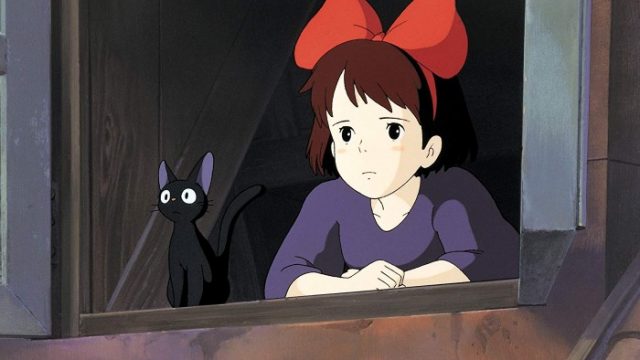Good morning, dearies! Did you have a nice July? Any plans for the end of summer? Anyways, on with the articles…
On the 28th, Carl Broughton celebrated Kiki’s Delivery Service, and its main character, over at Film School Rejects:
“Like many of the other female characters we encounter in Miyazaki’s filmography, Kiki is strong-willed and independent. Nurtured by caring parents, she is ready to take on the world, but leaving the shelter of her home and small-town challenges Kiki’s will as she must learn to adapt to a vast and contemporary city. From the onset of her journey, Kiki’s viewpoint and identity face challenges as she encounters another young witch who is close to finishing her one year of training. As the witch questions Kiki about whether she has a special skill set to help her make a living away from her parents, the audience begins to see seeds of doubt planted into the heart of the girl. This scene is just the beginning of where Miyazaki’s adaption diverts from the original novel, as the director leans more into the sense of loneliness and depression Kiki faces.”
Nolan Feeney interviewed Veronica Mars creator Rob Thomas for GQ, on the 29th:
“Of all the canceled cult-favorite TV shows to get another chance in the streaming era, it’s not entirely surprising that Veronica Mars is one of the lucky ones. During its initial run from 2004 to 2007, the critically adored drama—about a high school outcast (Kristen Bell) who moonlights as a detective for her father’s P.I. agency after her best friend is murdered—touched on so many pop-culture trends that have been in vogue in the past few years. It aired the murderous dirty laundry of tech millionaires long before shows like Big Little Lies; it had a complicated, sometimes-messy heroine before thinkpieces about them flooded the internet; and its irreverent, female-driven noir preceded the true-crime podcast boom and programs like My Favorite Murder.”
Also on the 29th, Rob Harvilla of The Ringer looked back on LFO’s classic song “Summer Girls” as part of their excellent “1999 Music Week“:
“Summer Girls” is on one hand hyperspecific to the late ’90s: in its mild boy-band lasciviousness, in its sly white-rapper transgressiveness, in its homemade and less algorithm-driven approach to mass-market pop, and in its commitment to the soft-core suburban-mall aesthetic. Pop radio in 1999 had a disoriented, throw-shit-at-the-wall quality, as though you were cycling rapidly through 15 different stations even if the dial never moved. Nobody knew exactly what worked, which meant, again, that anything might.”
On the 30th, Britt Peterson explored the moral implications of true crime as entertainment for The Washington Post, and made me feel guilty:
“On the first day of CrimeCon, the massive line of ticket holders snaked through the first floor of the Hilton, past a jewelry shop and the elevators and almost all the way to the lobby. CrimeCon guests — like true-crime fans generally — are demographically similar to the victims most featured in true-crime shows and books: 80 percent female, according to organizers, and largely white.”
Because one can never have too many Veronica Mars articles, Heather Schwedel of Slate, talked about how Veronica Mars anticipated the #metoo movement on the 31st:
“Rape culture is all over Veronica’s world right from the start: A fictionalized version of Girls Gone Wild called Girls Gone Bad comes up in Season 1; an online “purity test” is used to shame Veronica and her female high school classmates in another episode; a frat at Hearst College is revealed to have a points system for assigning scores to women, awarded to frat members for hooking up with them; and so on. And this culture might well be personified by Veronica’s classmate Dick Casablancas, the privileged Neptune High bully–turned–frat boy who seems to live to party and exploit women.”
Finally, on the 1st, Tambay Obenson explained how Blackstar became “the black Sundance” on IndieWire:
“In eight short years, Philadelphia’s BlackStar Film Festival has become a major celebration of the visual and storytelling traditions of the African diaspora, as well as of global communities of color. With a lineup primarily composed of short films and feature-length debuts, it’s also a major window into emerging talent.”
Enjoy!

